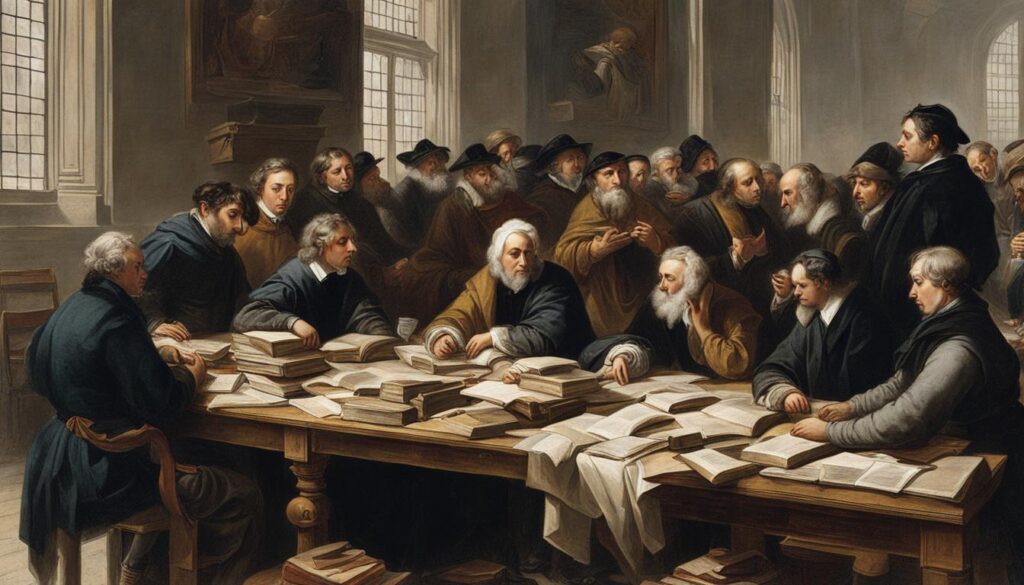Protestantism, with its diverse beliefs and interpretations, has long been a subject of controversy. The classification of Protestants as heretics is a complex and nuanced topic that sparks debates within religious circles. In this article, we will delve into the question of whether Protestants can be considered heretics and examine the heretical beliefs that are associated with Protestantism.
Key Takeaways:
- Protestantism has been a subject of controversy regarding whether its followers should be classified as heretics.
- The Council of Trent recognizes the validity of Protestant baptism, making them Christians in Christ.
- From a Catholic perspective, Protestants hold many beliefs that are considered heretical.
- Heresy in Protestantism refers to doctrinal beliefs that go against recognized Christian standards.
- The Protestant Reformation led to significant religious and political tensions, resulting in the formation of different denominations.
Understanding Heresy in Protestantism
In order to delve deeper into the question of whether Protestants are heretics, it is important to understand the concept of heresy in the context of Protestantism. Heresy, in this sense, refers to any doctrinal belief that contradicts the recognized standards of the Christian Church.
Protestants, like other Christian denominations, hold a variety of beliefs and interpretations of Scripture. However, some of these beliefs may be considered heretical from a Catholic standpoint. For instance, the denial of the Real Presence of Christ in the Eucharist or the rejection of the authority of the Pope are views that stand in opposition to Catholic teachings. These differences in beliefs were at the heart of the Protestant Reformation, which led to the formation of various Protestant denominations.
It is worth noting that heresy, from a Catholic perspective, entails a departure from the established teachings of the Church. While not all Protestant doctrines can be classified as heretical, there are certain tenets that deviate from traditional Christian teachings. These differences in theology continue to be a point of contention and discussion among theologians and religious scholars.
Examples of Heretical Beliefs in Protestantism:
- Denial of the Real Presence of Christ in the Eucharist
- Rejection of the authority of the Pope
- Denial of the regenerative nature of baptism
- Rejection of the doctrine of the Trinity
Historical Controversies in Protestantism

The Protestant Reformation, led by Martin Luther in the 16th century, ignited a significant schism within Christianity and gave rise to historical controversies that continue to shape the religious landscape today. Luther’s criticisms of the Catholic Church’s practices and doctrines challenged the authority of the Pope, the hierarchy of the Church, and various Catholic teachings. This led to the formation of different Protestant denominations, each with its own distinct beliefs and practices.
The Reformation caused religious and political tensions across Europe, resulting in conflicts such as the Wars of Religion. These controversies centered around theological differences, questions of authority, and the interpretation of Scripture. Protestant leaders and theologians sought to establish new ways of worship and faith, challenging traditional Catholic teachings and practices.
Protestant Schism
One of the key historical controversies in Protestantism was the schism it caused within the Christian faith. The disagreements between Protestants and Catholics led to a divide that questioned not only religious authority but also political power structures. The Protestant Reformation challenged the Catholic Church’s dominance in Europe and sparked a period of religious upheaval.
The schism within Christian faith resulted in the formation of various Protestant denominations, each with its own theological perspectives, interpretations of Scripture, and practices. These denominations, such as Lutheranism, Calvinism, and Anglicanism, represented different responses to the perceived corruption and dogmatism of the Catholic Church.
Protestant Denominations
The historical controversies in Protestantism also gave rise to a diverse array of denominations. As the Reformation spread across Europe, different regions adopted and adapted various Protestant beliefs and practices. This led to the establishment of denominations such as Lutheranism, Calvinism, Anglicanism, and many others.
Each Protestant denomination holds its own distinct set of beliefs and practices, ranging from theological differences to variations in worship styles and church governance. These denominations continue to shape the religious landscape today, with millions of adherents worldwide.
In summary, the historical controversies in Protestantism, particularly the Protestant Reformation, had far-reaching implications for Christianity. The schism it caused, along with the formation of various Protestant denominations, challenged traditional Catholic teachings and practices. These controversies continue to shape the religious landscape today, highlighting the diverse interpretations and beliefs within Protestantism.
Examining Heretical Doctrines in Protestantism

Protestantism encompasses a diverse range of theological beliefs and interpretations of Scripture. While not all Protestant doctrines are considered heretical, some deviate from traditional Christian teachings. One such doctrine is the rejection of the sacrament of baptism as a means of regeneration. Certain Protestant denominations view baptism as a symbolic act rather than a sacrament that imparts grace and initiates a believer into the body of Christ.
Additionally, there are Protestant groups that deny the doctrine of the Trinity, which is a fundamental tenet of Christianity. These groups may have alternative interpretations of the nature of God and the relationship between the Father, Son, and Holy Spirit. Another controversial doctrine in Protestant theology is the rejection of the authority of the Church. Some Protestant denominations emphasize the primacy of individual interpretation of Scripture over the authority of a hierarchical institution.
Examples of Heretical Doctrines in Protestantism:
- Denial of the sacrament of baptism as a means of regeneration.
- Rejection of the doctrine of the Trinity.
- Denial of the authority of the Church.
From a Catholic perspective, these heretical doctrines deviate from the established teachings of the Church and are considered theological errors. However, it is important to note that the classification of a doctrine as heretical may vary depending on the religious tradition. While the Catholic Church recognizes the validity of Protestant baptism and considers Protestants to be Christians in Christ, theological differences remain a point of contention and discussion between the two traditions.
In the next section, we will explore the historical context surrounding these heretical doctrines in Protestantism and how they have shaped the religious landscape throughout the centuries.
Conclusion
The Protestant Reformation, stemming from Martin Luther’s criticisms of the Catholic Church in the 16th century, resulted in the formation of various Protestant denominations with differing theological beliefs. While some elements of Protestant theology are considered heretical from a Catholic perspective, it is important to understand the complexities surrounding this question.
From a Catholic standpoint, heresy refers to doctrines that deviate from established Church teachings. However, it is crucial to distinguish between formal heresy, which involves a deliberate rejection of Church teachings, and material heresy, which may stem from ignorance or differing interpretations. The Catholic Church recognizes the valid baptism of Protestants, considering them Christians in Christ, despite the existence of heretical beliefs.
The exploration of religious differences and the pursuit of genuine dialogue are key in fostering understanding and unity among Christians of different denominations. The legacy of the Protestant Reformation continues to shape the religious landscape, and the study of Protestant theology is essential to comprehending the complexities of faith in this modern era.
FAQ
Are all Protestant doctrines considered heretical?
No, not all Protestant doctrines are considered heretical. While some beliefs may deviate from traditional Christian teachings from a Catholic perspective, it is important to recognize the diversity of beliefs within Protestantism.
What are some heretical beliefs within Protestantism?
Some heretical beliefs within Protestantism may include the denial of the Real Presence of Christ in the Eucharist, the rejection of the authority of the Pope, or the denial of the regenerative nature of baptism.
What led to the Protestant Reformation?
The Protestant Reformation was sparked by Martin Luther’s criticisms of the Catholic Church’s practices and doctrines. This led to a questioning of the authority of the Pope, the hierarchy of the Church, and various Catholic teachings.
How did the Protestant Reformation impact Europe?
The Protestant Reformation caused significant religious and political tensions across Europe. It led to conflicts such as the Wars of Religion and resulted in the formation of different Protestant denominations.
Are all Protestants considered heretics?
From a Catholic perspective, certain Protestant doctrines may be considered heretical. However, the Catholic Church recognizes the valid baptism of Protestants and considers them Christians in Christ.

